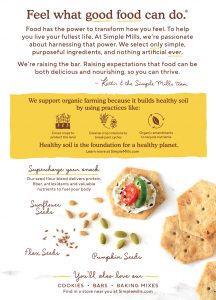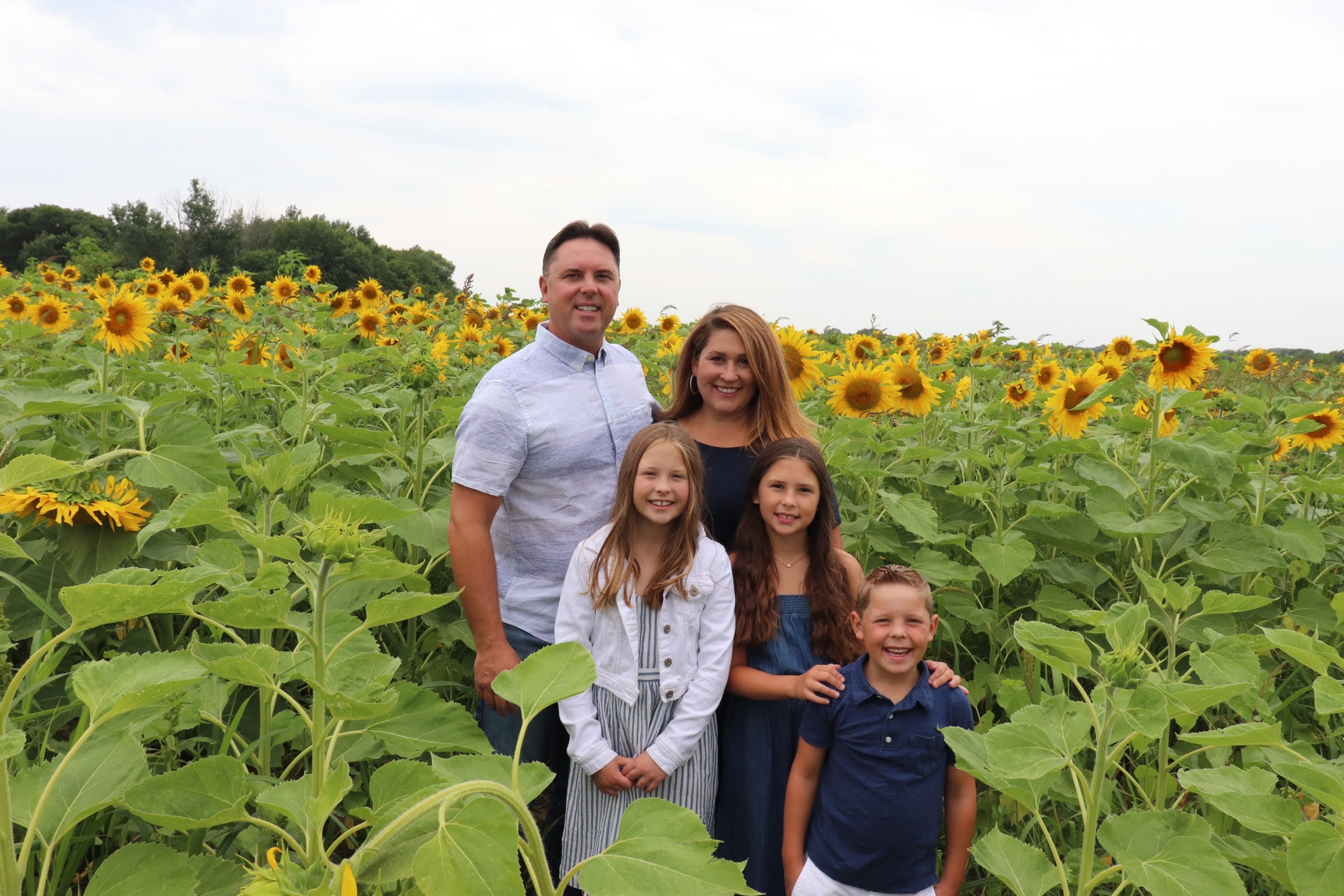Food company disrupts commodity agriculture system by contracting directly with farmers and incentivizing regenerative practices
In April 2020, Emily Lafferty, senior manager, strategic sourcing at Simple Mills, asked Minnesota farmer John Strohfus if he could grow 300 acres of organic sunflowers for a new organic cracker product her company was developing. Strohfus had never grown organic sunflowers before but was eager to try.
“I’m a quick learner and love trying new things, and I said yes,” he says.
Strohfus then reached out to two other farmers in his network to see if they could also grow the sunflowers. He also contacted a processor in North Dakota who agreed to clean and dehull the sunflowers. In this way, Strohfus and Simple Mills put together a value chain to produce organic sunflowers for Simple Mills’ cracker product.
The result? This spring Simple Mills launched their first USDA certified organic cracker product, Organic Seed Flour Crackers, while promoting their commitment to regenerative agriculture. By working directly with Strohfus, Simple Mills is disrupting the traditional commodity agriculture system, incentivizing farmers to adopt regenerative agriculture practices, and increasing transparency for consumers who want to know where their food comes from.
Simple Mills was founded in 2012 in the kitchen of Kaitlin Smith, who launched the company after recognizing the value of healthy foods while working as a management consultant. She experimented with recipes in her kitchen, aiming to make nutrient-dense foods with simple, whole food ingredients. Smith developed a line of almond flour-based muffin mixes and started selling them online.
Simple Mills grew from there and now makes some 40 products, including baking mixes, cookies, crackers, frostings, and food bars. The products are sold in more than 25,000 stores in North America, as well as on Simple Mills, Amazon, Thrive Market, and other websites. Based in Chicago, Simple Mills has 80 employees.
Direct trade program
As Simple Mills has grown, there has been a growing recognition that producing nutrient-dense foods starts on the farm, particularly in the soil.
“We’ve evolved our mission to include how our food is grown and ultimately who is growing it as well,” Lafferty says.
That’s why last year Simple Mills established a direct trade program to contract directly with farmers like John Strohfus to source crops like sunflowers for Simple Mills’ products.
“We saw an opportunity to partner more closely with the producers who are growing the crop species that we use as ingredients,” Lafferty says.
Farmers earn a premium price for the crops they grow as well as for implementing regenerative agricultural practices such as cover crops and diverse crop rotations that build soil health.
“If you can get a premium because a brand is interested in incentivizing those practices, there’s another reason to do it,” Strohfus says.
The goal is to bring added value to the farmer and the brands that wouldn’t normally be realized in a traditional commodity agriculture system.
“The real takeaway here is that we’re working to ‘de-commodify’ a commodity system,” says Shauna Sadowski, Simple Mills’ vice president of sustainability. “How do you go from sourcing commodity ingredients to instead sourcing ingredients based on people, places, relationships, and connection to where and how those ingredients are grown?”
Transparency and traceability
The benefits of the direct trade program for Simple Mills are transparency for their consumers and the enhanced traceability that comes with a very short supply chain.
“A primary goal of the program from a traceability and transparency standpoint is communicating to our consumers a better understanding of where food is coming from, how it’s being grown, and who’s growing it,” Lafferty says.

Simple Mills’ Organic Seed Flour Crackers box describes how organic farming practices build healthy soil.
As an example, Simple Mills’ new Organic Seed Flour Crackers’ boxes feature a description of the organic and regenerative farming practices that build healthy soil—and thus healthy foods.
“When consumers pick up that product, they can read about what organic farming does, how it connects with the soil, and why that matters,” Sadowski says.
Lafferty admits her company was “just getting our feet wet last year” with the direct trade program.
“We’re learning as we go and also understanding how this commodity system has become what it is and while we’re disrupting that, we are still honoring food safety and quality and other factors along the way for our program,” she says.
Deepening the connection with farmers is central to Simple Mill’s mission.
“The more that we understand what farmers are doing on the ground, the better business we’re going to become,” Sadowski says. “We are known for making food products, but we cannot make food without the farmers. We want to build relationships with farmers so we can be a better food company.”
Simple Mills is expanding the direct trade program this year. They are contracting with Strohfus and three other farmers to expand sunflower production to 500 acres this year. They are also working with almond growers in California and a farmer in Ontario to develop a new oilseed value chain in North America.
Simple Mills has also started an agroforestry project with PUR Project, a group focused on regenerating ecosystems to improve farmer livelihoods and strengthen food companies’ supply chains. The project involves integrating trees into farming systems for coconut production in Indonesia where Simple Mills sources coconut sugar.
“There will be more acres, more farmers, and what we’re looking to do is drive more impact,” Lafferty says.
“Natural evolution of how we farm”
It seems that every week large companies, including food giants like General Mills, Cargill, and PepsiCo, are making commitments to advance regenerative agriculture. But regenerative agriculture can mean different things to different companies.
“There’s not one set definition,” Sadowski says. “We have a definition that really focuses on the outcomes that we’re trying to achieve, looking at it in terms of soil health, biodiversity, and empowering rural communities.”
To achieve those outcomes, Simple Mills encourages adoption of regenerative agricultural principles and practices as presented by the Natural Resources Defense Council and the Soil Health Academy. Some of these practices include cover crops, diverse crop rotations, organic soil amendments, reduced tillage, agroforestry, hedgerows and pollinator habitats, and perennial crops.
But Lafferty emphasizes that Simple Mills is not prescriptive about which practices farmers use.
“What a farmer chooses to do is going to be very much contingent on where they are, what’s available to them, what they know, and what they have access to rather than us prescribing ‘you must do this.’ They know their land.”
John Strohfus says regenerative agriculture “is going to become a natural evolution of how we farm.”
“If you can prove over a period of time that the added expenditure of cover cropping has a soil health and input reduction benefit, farmers will do that because there’s a commercial incentive to do it. And that’s the best thing. We have an environmental improvement and a commercial improvement, a true win-win,” he says.
Looking at the big picture, Sadowski says regenerative agriculture—which has been shown to sequester carbon and help mitigate climate change—is a necessity for the world today, and Simple Mills is playing its part to advance it.
“If we don’t have farmers moving towards regenerative outcomes, we’re all going to suffer the consequences. It starts with the farmers. And through focusing on farmer connections, we hope to be part of bringing this movement forward.”





